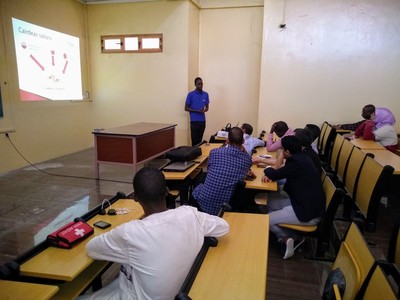
A Pain Management Breakthrough in Mauritania
![]() Cairdeas
Cairdeas
![]() 10th May 2019
10th May 2019
Dr Dave Fearon leads the Cairdeas Sahara project which was established in 2014. The project is one of the first palliative care services in West Africa, where health workers are unfamiliar with even the basic principles of holistic palliative care. Often, pain and other burdensome symptoms are left ignored or even denied by health workers. Fortunately in recent years there have been huge strides in progress, particularly in pain management. Dave reports on the most recent step forward: access to morphine tablets.
As many of you will know, severe pain is a common problem for people with life-limiting conditions anywhere in the world. It is no different here in the Sahara. The majority of our patients at Cairdeas Sahara in Mauritania have advanced cancer and pain. Thankfully we have a good working relationship with the national cancer centre where morphine is available. Up until recently it was only available in injection form or long-acting tablets, which was not ideal. There was no liquid or tablets which worked quickly, which are very useful when starting morphine and for ‘break through’ pain relief to use any time of day or night. We have been asking for this for several years, but it was not until a new director, oncologist and paediatrician Dr Benina, was appointed at the end of 2018 that we have seen change. We now have a short acting morphine tablet. She is not yet satisfied and is still pushing for an oral suspension or liquid form, especially for her young cancer patients.
We have recently been invited by the cancer centre to train the doctors on how to use these new tablets. In contrast to many countries where doctors are reluctant to prescribe morphine, here we have a different problem, the overuse of morphine injections. Several of our patients have been treated very liberally with morphine injections whenever they have attended the cancer centre. The doctor gives them a morphine injection for their pain. They really like these injections because they work very quickly (although the effects wear off quickly as well), and like many Mauritanians they think injections are more powerful than little tablets.
The Cairdeas Sahara team are now working with five or six patients who are in this situation, of switching from the injections to the tablet format. NDiaye, the lead nurse is doing a great job and is being stretched in his communication skills. Importantly, the cancer doctors are fully supportive of our work and are now aware of how to start oral morphine. We can already seen the benefits for our patients.
You can find out more about the Cairdeas Sahara project here.

Morphine training with doctors at the cancer centre
Bringing Hope to Uganda
![]() Cairdeas
Cairdeas
![]() 19th March 2019
19th March 2019
Dr Peace Bagasha is the first renal physician and palliative care physician in Uganda. Peace writes below about a story of how she was able to bring hope to a young man with kidney disease in Uganda.
I stood by his bedside in Kiruddu Refferal Hospital watching him struggle to breathe in and breathe out. I had seen him multiple times on many hospital admissions over the past 12months. He was barely 35, almost the same age as me, but this time was different. We would not be having the same conversation about life and options as we had had before. We would not even be having a verbal discussion this time round. I had said “hello” earlier and the most he could manage was a smile when he turned and recognized my face. He had no energy to reply beyond the smile, he was saving every breath to just breathe in and breathe out.
In a way John was the exceptional one out of many of my end stage kidney disease patients. Fully aware of his personal financial situation, and having experienced the struggles of his older brother who was on dialysis, he had adamantly chosen not to even think about hemodialysis as an option. He chose from the very beginning maximum conservative management adamantly stating that “I cannot afford dialysis”.
His family was seated around him fully aware that he had not many days or even hours left. He was not in pain. He was comfortable thanks to the care and support provided by the palliative care team.
With no national health insurance coverage supporting renal care, in Uganda patients have to pay out of pocket for renal replacement treatment including hemodialysis and kidney transplant. Costs range from 500,000Ugshs per week for dialysis to 100millionUgshs for a kidney transplant abroad. This makes hemodialysis inaccessible for majority of Ugandans. Some try to sell property and assets but funds soon run out and poverty levels worsen. Conservative care is the forced option for most.
With access to palliative care services provided by the palliative care team in Kiruddu, John and his family had the rare opportunity in Uganda to experience dignity and get holistic support at the end of life. Without financial support from people like you, many other Johns will not have an opportunity as special as this.
#BringingHope. Donate here.

Dr Peace Bagasha with a patient in Uganda
Hope in Various Ways - Dr Polly Noble, PcERC Clinical Team
![]() Cairdeas
Cairdeas
![]() 19th March 2019
19th March 2019
The end-of-life can be a scary and difficult time for patients, their loved ones and health care professionals. Although it is an inevitable event, we can be overwhelmed by fear of the unknown and problematic symptoms.
Being a newly qualified healthcare professional, I found end-of-life care very difficult to manage and had limited specialist experience in that field. As medical professionals we are taught how to 'fix' people, and so facing mortality of our patients can be distressing or feel like we have failed them. However having worked alongside the experienced team at PcERC, I have learnt that it is in fact possible to bring hope and comfort to patients and their families at this difficult time.
A story which sits at the forefront of my mind is that of LM, a patient with Cholangio carcinoma. PcERC supported her for several weeks during her inpatient stay whilst she was receiving chemotherapy. Initially the team were asked to consult to help manage her distressing symptoms, particularly pain.
After discussing her concerns, we were able to understand that her pain was poorly controlled in part because she was concerned about the effects of medication and so had not been using them correctly. After fully exploring her concerns we were able to arrange a pain control regime that suited her and managed her symptoms. Consequently she was brighter, able to and able to enjoy time with her loved ones rather than suffering in pain.
However what LM and her carer reported they appreciated the most from our team was our time. They expressed that our input meant they felt listened to, had better understanding of her condition and felt more confident in caring for LM. I realised that hope can come in many forms, although her outcome and prognosis were not changed, we were able to improve her quality of life with symptom control and knowledge.
It has been a real privilege to work with PcERC and see the fantastic work they do to help make death as dignified and peaceful process as possible.
#BringingHope. Donate here.

Dr Polly Noble
